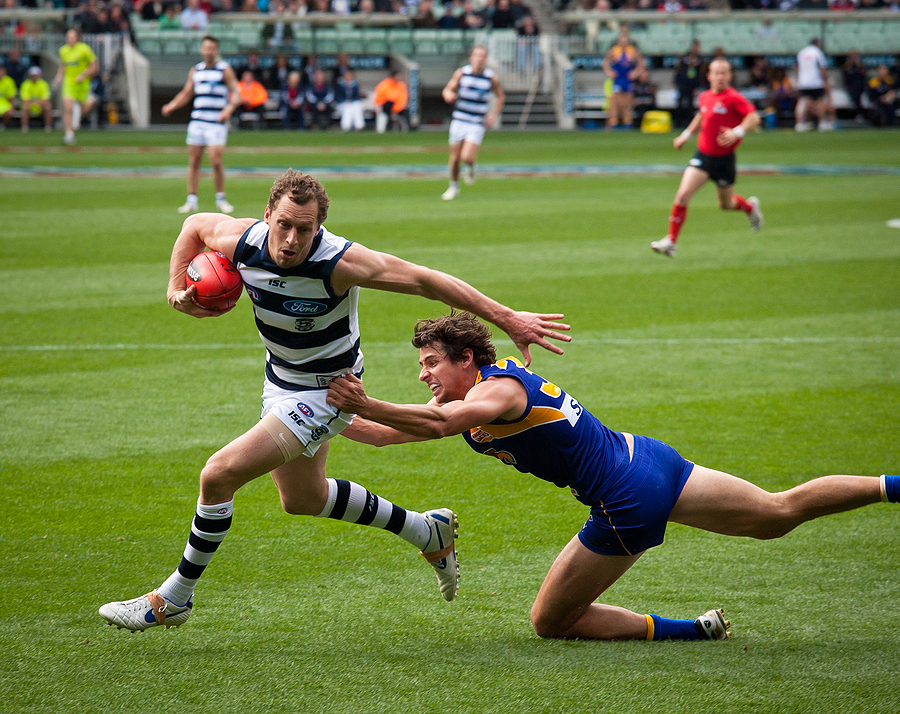The Australian Football League must introduce a policy around chronic traumatic encephalopathy (CTE) and change its culture around concussions to better protect players, experts have told an inquiry.
About 80 players are diagnosed with concussion each season in the AFL and AFLW.
The league’s medical chief said while concussion guidelines are in place, official policies are also needed to improve health outcomes for players, given the link between repetitive head trauma and CTE.
“We need to have a policy to show how seriously we take CTE in our sport,” Michael Makdissi told a senate inquiry into the issue on Wednesday.
He said the AFL needed to work more closely with the AFL Players Association to address concussions.
“I’ve seen quite a shift in (the) culture, I don’t think we’re there yet,” Dr Makdissi said.
“We need some continued education.”
Cricket Australia told the inquiry it was reviewing its existing policies around concussions with updates expected in coming months regarding players who experience multiple head knocks each year.
CA’s head of sports science and medicine, Alex Kountouris, said there are an estimated 20 concussions a year across 300 players.
“It’s not a common occurrence,” Mr Kountouris told the inquiry.
In a written submission, a former football executive who said he feels ashamed and distressed watching sporting bodies fail to protect players from concussion.
John Hennessy, a former Victorian Football League corporate planner who helped steer the development of the national AFL competition in the 1980s, labelled the concussion crisis a “national disgrace” in his written submission to a senate committee probe on the issue.
What’s more, it was embarrassing the solutions to fix it were quite achievable, he said.
“The most important possession anyone has is their brain,” Mr Hennessy wrote in the submission.
“At the moment we are not adequately protecting it when playing sport. Children, in particular, are at high risk.
“We are gambling with people’s lives.”
Mr Hennessy is among witnesses slated to give evidence at the public hearings for the senate committee inquiry into concussions and repeated head trauma in contact sports.
The AFL, the AFL Players’ Association, Cricket Australia and medical professionals are also giving evidence on Wednesday, along with law firms Griffins Lawyers and Margalit Injury Lawyers, which have each launched class actions against the AFL over concussion-related injuries.
Mr Hennessy pointed to soaring rates of concussion and hospitalisations in junior football, increasing rates of concussion in the AFL competition and ongoing problems for thousands of past players facing inadequate support as they dealt with mental health issues and early onset neurodegenerative diseases.
The AFL, in its written submission to the inquiry, acknowledged head trauma appeared to be associated with an increased risk of neurodegenerative disease.
But it said the association between head trauma and long-term psychological health was less clear, given depression and anxiety – common symptoms of traumatic brain injuries – were also common in the general community.
The AFL pointed to its five-year concussion strategic plan as among ways it was addressing the risk, along with guidelines that addressed the need for a more conservative approach when it came to children and adolescents.
The senate probe is analysing the liability of sporting associations and clubs when it comes to the long-term impacts of concussions and repeated head trauma.
The AFL maintained in its submission it has conducted competitions “consistent with applicable duties of care”.
The AFL Players’ Association noted in its submission that while concussions in the sport were trending down, a 2022 survey showed almost one in four AFL players experienced one while training or playing.
In the AFLW, 17 per cent of players said the same.
Mibenge Nsenduluka and Cassandra Morgan
(Australian Associated Press)





